
The Free Press

A few months ago, we learned about a young man whose name we’re withholding, which is something we very rarely do, because he insists it’s for his safety.
This young Palestinian man is from a small village in the West Bank, and he grew up there with limited access to water and without a regular supply of electricity. Most of the kids he grew up with dropped out of school and went into manual labor. But this young man chose a different path. He won a scholarship to leave the West Bank and to study abroad for college. He ended up earning three degrees in three different countries. And then he landed a tech job with an Israeli company, of all places. (For context, among the 360,000 workers in the Israeli tech sector, there are only a few dozen Palestinians from the West Bank.)
His story is one of setbacks, hardships, and discrimination, but also of hard work, perseverance, unlikely friendships, and in the end—against all odds—success.
But then his life was ruined. . . by a social media post. On October 7, he woke up in his home in the West Bank to the news of the massacre happening inside Israel. While some people in his community celebrated, he was horrified. He posted online how he felt: “What sad and horrible news to wake up to and out of words and unable to digest what’s going on right now. I’m Palestinian and firmly stand against this terror. I pray for the safety of my friends, colleagues, their loved ones and everyone else affected.” He continued to post about how he felt—six posts in total.
Suddenly, he says, 500 people unfollowed or unfriended him on social media sites. People blocked him on WhatsApp and, in real life, people stopped speaking to him altogether.
And then, people started calling him a “traitor.” And as he told me in this interview, the word traitor means something in the West Bank. “It means they are going to kill you.”
Since that day, he hasn’t been able to commute to Israel to work. The crossings are closed, and the work permits for Palestinians have been suspended. He stays home with his family, and he doesn’t go out because he says it’s just too dangerous. He feels isolated, unsafe, and scared for himself and for the safety of his family.
I asked him if he regrets what he posted. He said no. He said that remaining silent in the face of the atrocities would have made him no different from those who committed the crimes.
I often talk about courage and about the courage to speak your mind even when it’s unpopular or dangerous. I often reference my personal heroes, people like Natan Sharansky or Masih Alinejad. But so few people are willing to walk in their footsteps in real time, in real life, when the stakes are the highest imaginable.
My guest today is one of those people. Today, he explains where he gets the strength to speak up, even if it means risking his life, and why it matters to him to say what he believes.
To listen to my conversation with him on Honestly, click below or scroll down to read an edited transcript.
On speaking to us anonymously:
BARI WEISS: One thing that’s a little unusual about this conversation is that you told me you don’t want to share your name. Can you explain why that is?
ANON: I don’t live in a place that respects freedom of speech. What I did on October 7—condemning it—has put me in a very dangerous position. I have been called a traitor multiple times by multiple people. Doing this interview, to be honest, I’m afraid. But I know that I had to do it. I think everyone should speak up. Without speaking up, nobody can make a difference or create change. People only see hate from both sides. You don’t see someone who is standing up condemning what’s wrong. And by speaking today, it’s my chance to show there’s a different side to what’s going on.
Growing up in a small West Bank village:
BW: Tell us a little bit about what your life was like growing up.
ANON: I was born in a refugee camp in Jerusalem, but I grew up in the middle of nowhere in a small village in the West Bank. It was a quiet life. We had disadvantages. We had limited access to electricity. We had limited access to water. I’m not sure if you would believe it, but until 2019, we didn’t have internet at all here. I grew up in a place where the highest aspiration of my classmates or my schoolmates was to obtain a permit to work in manual labor in Israel. Eighty-five percent of my classmates either dropped out of their studies or graduated only to work in Israel in manual labor.
I grew up in a traditional, conservative place; we had separate schools between girls and boys. I mean, if you looked at one girl, something bad would happen to you. . . like getting beat up or even getting killed. So this is the place I grew up.
My mom was a housewife. My father worked in manual labor in Israel. It was our source of income.
BW: Growing up, what were you taught about Israel and the Jewish people more generally?
ANON: To be honest, growing up, they would use the word Jews to scare people or to scare kids because the general image of the Jews—it’s the army. Until the age of 27, I never met an Israeli without the uniform.
I was 10 or 11 years old during the Second Intifada, but I was too young to think about what was happening.
A life-changing book:
ANON: When I was 15 or 16, my father came home one day from working in Israel and brought a bag of stuff. And inside the bag was this book: Man’s Search for Meaning by Viktor Frankl. And I used this book to learn English. And it actually became my guiding light that helped me navigate my life. The main idea about this book is that everything can be taken away from you except your attitude and reaction to any given situation, whether it’s good or bad. And this is what pushed me to study more, to excel at studying, to get a scholarship to go abroad.
It was also the first time learning about the Holocaust and the horror of what happened in World War II. This is not something we were taught in school or something that was even mentioned. So after reading this book, it kind of changed my whole perspective, my whole idea about how I see the Jewish people.
On leaving the West Bank on a scholarship to study abroad:
ANON: The first time I left the West Bank, it was over 12 years ago. It was my first time going on a plane. It was like a culture shock, meeting different kinds of people, different religions or orientations, or backgrounds, or countries. I didn’t know about the LGBT until I left. I met people who don’t even believe in God.
The first time I drank was in South Korea. It was a Heineken. It tasted bad.
But I got the chance to ask myself the difficult questions or the questions I was not allowed to ask myself in my hometown. I even asked myself if there is even a God. I attended a church for about four months. I went to a Buddhism temple where I stayed for about a month. The meditation taught me so much. My whole mindset evolved. I was more curious. I wanted to ask the difficult questions. I wanted to experience life. I wanted to actually learn what we weren’t taught in school and what we didn’t see back home.
During one of my classes in South Korea, they were talking about the Israeli start-up scene, and it kind of blew my mind. I was amazed. Israel is a very, very small country and it has the highest concentration of start-ups in the world? So when I learned about the Israeli start-up scene, I wanted to be a part of it.
BW: I want to make sure I’m understanding. It was only by going to South Korea, despite the fact that you lived less than 50 miles from Tel Aviv, that you learned about the Israeli tech sector?
ANON: I know how that sounds, but yeah. There was a book called Start-Up Nation, and I read it and it was mind blowing. And this is the main reason I wanted to come back—to be part of the Israeli tech scene. For me, it was worth the sacrifice.
A lone Palestinian in Tel Aviv:
BW: So you go back to the West Bank. And you start your MBA at Tel Aviv University on a partial scholarship. How?
ANON:I found an Israeli program that helps Palestinian students from the West Bank and Gaza find internships in Israeli high-tech companies. I got an internship. And actually, during the interview, it was the first time ever that I met an Israeli that was not wearing a uniform. And we have been friends ever since. He’s like family to me.
So I got accepted into this company, and I did the internship for about five months. And then I applied to Tel Aviv University.
BW: What was the daily commute from where you live in the West Bank to Tel Aviv, before October 7?
ANON: From my house to the university, it takes about eight hours or more total, especially at night, because there is no transportation. You have to go through a checkpoint. They take your bags—everything—and they search you, and check your permit, and if everything’s good, you pass the checkpoints. Then from the checkpoint, you would take transportation to another city in Israel. And from that city, take public transportation to Tel Aviv.
BW: I want people to understand how wild that is, considering that it’s under 50 miles from where you live to the university. So it’s a distance that should be drivable in less than an hour, but it’s taking you eight hours total. Why didn’t you just rent an apartment in Tel Aviv?
ANON: Trying to rent an apartment in Tel Aviv was one of the most difficult things that I ever had to face. I would start the conversation over Facebook once I saw a listing, and at the beginning I say I am from the West Bank, and I get an instant block. So I started saying I’m from Jerusalem, so it’s kind of vague. But once I get past the conversation over Facebook, and I would go to see the apartment. . . you know, like, I look Arab. . . and I had to be honest when I meet them and tell them I’m Palestinian. The success rate was zero.
It was one of the most difficult things. I needed to attend my classes at Tel Aviv University, and I was desperate. In the span of one year, I lived in over twelve places; most of them were actually my friends’ sublets. Sometimes I even slept outside on benches for a few nights when I couldn’t find a place.
But there was a bright side to living in over twelve places. It allowed me to meet so many people from so different backgrounds. I met all types of Jews, Ashkenazi, Mizrachi, or Sephardi. I used to have Shabbat dinners with them. I used to ride the bicycles on Yom Kippur, even lighting the candles for Hanukkah.
BW: One thing that’s just striking to me as you’re talking about this, is that you are describing a situation where you’re facing really intense housing discrimination, no one will rent to you because you’re Palestinian, you’re couch surfing and even homeless some nights, sleeping on the street. And yet, you’re ending on a very positive note about finding the silver lining in a really hard situation. A situation that most people would think about giving up on. What kept you going?
ANON: To be honest, the book Man’s Search for Meaning was the light that guided me. I knew I had to make it. I had to succeed, and I had to do whatever it took. And this is what I did.
I lived with a soldier at one point—he was one of my friends—and I stayed on the couch in his house. We were very different—how we think, our views—but we were friends, and I don’t believe that different views means that you cannot be friends with someone.
BW: There was some period where you couldn’t afford the remaining fees at Tel Aviv University. How did you find the money?
ANON: I started the program with very little money, and the remaining fees were still a lot. So I needed to figure out a way to cover the other half of the scholarship because I was getting warning letters from the university.
So I messaged and cold-emailed over 100 people. And only one person responded. He was my angel and my savior. At this point, I was actually expelled from the university for not paying the funds, and he swooped in to cover the rest of the tuition, and he helped to get me reinstated. Not only that, but he let me stay at his house until he helped get the university to give me a dorm room, and he covered that as well. He’s famous in Israel: David Broza. He just responded to my message, “Hi, how are you? Would you like to grab a coffee?” He didn’t do a background check; he didn’t know anything about me. He saw someone who’s determined, someone who wanted to succeed, and he helped. And if I say thanks to him from now until the day I die, it won’t be enough for him. He saved me. He’s an incredible person. He’s an amazing musician, and he’s an incredible person.
BW: Most people hearing your story would say you’re a victim, look at the cards that you’ve been dealt. But amazingly, even now you’re saying, “No, I’m not. And I’m making a choice to be hopeful.” Do you think that kind of attitude, that kind of resilience, is teachable?
ANON: The perseverance that I have is from my experience. I went through so much when I came into Israel; I was on the brink of tears and collapse. And I did cry a lot, especially when I was handed the expulsion letter from the university. But at the end of the day, it’s about how you react. It’s about what you do about it to change the situation. And for me, I needed to make it work.
It’s not very common to see a Palestinian working in high tech in Israel or a Palestinian studying at Tel Aviv University. So, for me, it was about giving hope to others like me, who want to take that step. Yes, I was on the brink of collapse, but I had to make it. I had to do everything in order to succeed. And even after I was expelled, I did everything I could: slept in so many places, with or without a roof. It’s not just for me, but for everyone. I believe my journey made a difference. And this is why I never gave up.
Speaking out on October 7:
BW: Let’s talk about the morning of October 7. What thoughts were going through your mind that morning?
ANON: Before talking about this, I want to say: I’m Palestinian, and I’m proud of it. But that day, it was different for me. It felt different. Seeing those images of women, children, and elderly being taken as hostages or killed, I felt ashamed. I couldn’t comprehend what was happening. I was very confused. I couldn’t believe it—because Israel has one of the strongest armies. I had to go wash my face and come back to really believe that this is actually happening.
It was horrible. It was really bad for me, personally, because I thought about my second family, my friends, everyone who I met in Israel, everyone who I spoke about during this interview. So I felt worried and unwell. I couldn’t imagine anything bad happening to them. So I texted everyone I know to make sure that they were safe. Thankfully, everyone was safe, at least physically safe. But, all of us were unwell mentally. We weren't okay that day. I was not okay.
I cannot comprehend how anyone could cheer for, or justify, what happened on October 7. I was actually getting to know a girl from the West Bank and she was happy about what was happening, and I was not, and we got into an argument. And it ended when she blocked me.
That same day, I posted online. I said, like, “I’m Palestinian, and I stand against this terror. I wish safety for my friends and colleagues.” To be honest, I didn’t think about the consequences and what might happen. I just wanted to let all the people who I met throughout my journey know that I wish for them to be safe. I wanted them to know that there’s something different than what they saw on October 7’, there’s someone who is against what happened. It was something that I had to do.
BW: I want to read what you posted: “What sad and horrible news to wake up to. I’m out of words and unable to digest what’s going on right now. I’m Palestinian and firmly stand against this terror. I pray for the safety of my friends, colleagues, and their loved ones and everyone else affected.” How did people react to that post?
ANON: My Israeli friends appreciated my post. They felt it was sincere. They felt that they had someone on their side. But on the other side, I started seeing the numbers of my connections and friends decrease. I couldn’t understand that reaction. I was very disturbed by it. Many people removed me and stopped talking to me. I reached out to ask, “Why did you delete me? What happened? Can we have a conversation?”
And I remember one person told me, “You are a traitor.” And after that, three other people called me a traitor. And in the West Bank and in Gaza, if you are labeled a traitor, it means you are in danger. It means you’ll be hanged or killed. And this is what I have been fearing ever since.
BW: I want listeners to understand the stakes. What have you seen happen to Palestinians that have been labeled collaborators or traitors?
ANON: Being called a traitor means your life, your family, your home are in danger. People are hanged or shot down without a trial, without interference from our supposed “government.” And then after they’re hanged, they keep him there. As a warning, a message to others.
I don’t regret what I did, but I had to delete this post. And I had mixed feelings: I felt scared from the way that people reacted to my post. And I also felt regret that I deleted it. I should have kept it up. I did nothing wrong. I condemned a terrorist group who was the main reason for the horrors, for the death, for many people losing their loved ones, their livelihood. Many Gazans were killed, buildings were destroyed, destruction on both sides. And there is only one side to blame. There’s one party to blame, which is Hamas.
Hamas is the same as Hezbollah, the same as the Yemeni Houthis, they are just proxies of Iran. And they don’t really care about the well-being of the Palestinian people. Death benefits them. This is why they continue. They have no regard for Israeli or Palestinian life. I don’t think kidnapping children, toddlers, and women can be called freedom fighting. And anyone who tried to justify it should be ashamed of themselves.
Trying to leave the West Bank:
BW: You’re trying to leave the West Bank. And I wonder what future you see for yourself. And if we could go back in time to October 6’, how did you originally imagine your life continuing?
ANON: Prior to October 7’, I was very happy. I was living a beautiful life. I worked in Israel. I had very amazing colleagues, friends, and family on both sides. Yes, it took me five hours to see each of them, and yes, there was discrimination—I could not lie about that—but it was worth it. I was not something ordinary. I was a Palestinian with his computer bag, crossing borders and breaking barriers. It was a mission that I was proud of. I loved my life. And I met so many people who had never even met a Palestinian before. And I was able to make a difference, make a change with my story, with my journey.
Before October 7’, I never thought for a second that I wanted to leave. I thought, I want to do better and get bigger at my job. I had other dreams within this country.
Sadly, after October 7’, after my post, my life shifted. I don’t feel safe anymore. I used to feel safe where I am, but now it’s been nine months of constant fear, constant worries. I lost so many friends and connections. And as I said, you are supposed to feel safe, especially in your hometown. But I do not feel safe.
My main goal now is to find a job. Because seeking asylum takes years. And when your life is being threatened, you look for the fastest way, which is finding a job [and leaving].
I don’t feel safe here anymore. I cannot be here anymore. I want to be in a place where I can speak up without fearing for my life.
BW: Do you still feel hope, despite everything that’s happened?
ANON: As you know, Hamas’s ultimate goal was to incite hatred, create division, and make peace seem impossible. We should not allow that. I may be only one person, I understand that. I’m honestly scared as hell. Even speaking to you today, I’m very nervous and frightened. But at the end of the day, I have to speak up. We all have to speak up. I hope more people see the truth, stand for what is right, and strive to bring people together rather than create more division—because they want us to hate each other.
It will take so many years in order to overcome what happened. But I believe we still have hope. I still believe it’s possible for both sides to live side by side. We should not allow Hamas to succeed in destroying this hope.
We are cousins that need to deal with our own issues and find a way to live together—because the Israelis are not going anywhere, and the Palestinians are not going anywhere.
If we don’t find a way to live together, this cycle of conflict, death, and horror will continue. And maybe our generation is a lost cause, but at least we should do it for the future generation, for our kids and grandkids who deserve a better life, a better future. They deserve to have dreams, and they deserve to live in peace. This is one of the basic rights that every human on this earth should have.
We need to put our differences aside and make it work. It will take so much time. But I believe we still have hope, and time will prove it.
If you have a job opportunity for this person, please email: contact2024m@gmail.com
If you, like us, want to contribute to his relocation:
https://www.gofundme.com/f/Support-Our-Friend-To-Rebuild-His-Life
And to support more vital conversations on Honestly, become a Free Press subscriber today.

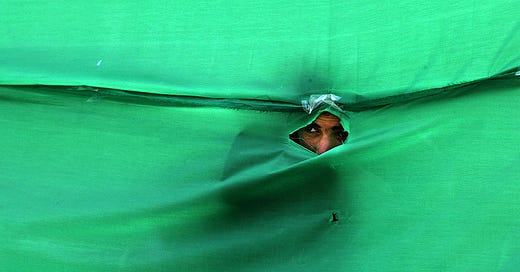


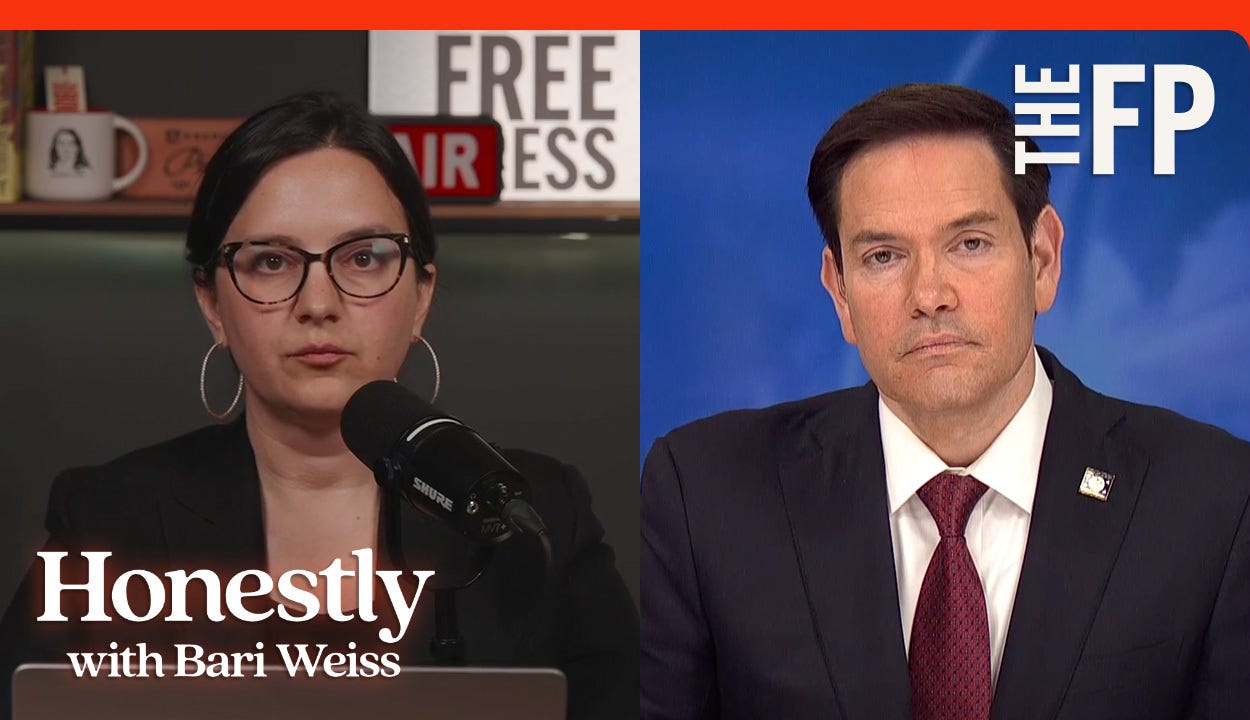

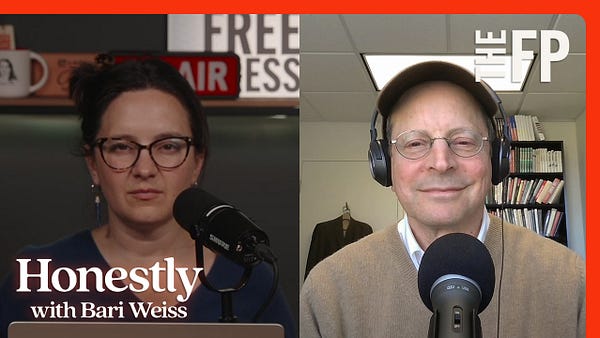

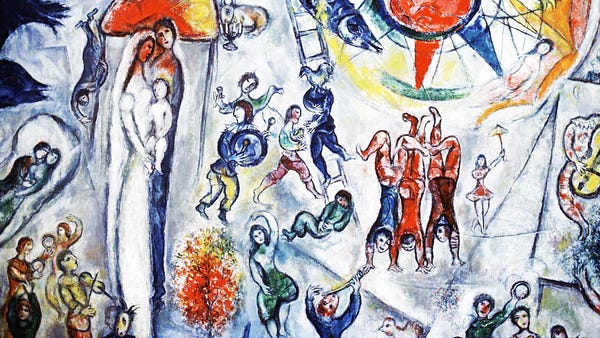

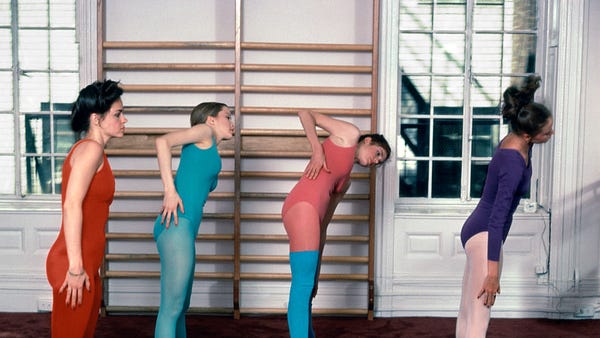

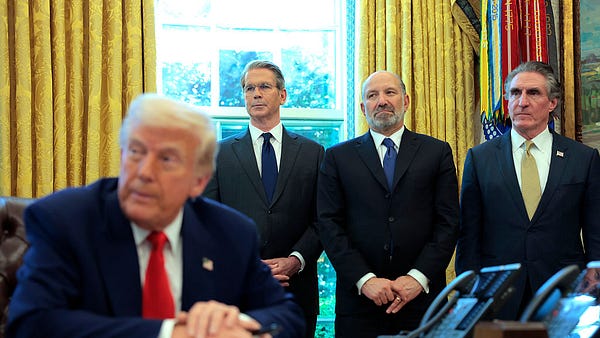

Just three comments: 1. The Palestinian Authority, run by Mahmoud Abbas in the 20th year of a 4 year term sans elections, has received unbelievable sums of money in aid - and, like Hamas in Gaza, spends none of it on the Palestinian Arabs themselves. There should be no villages like the one in which he grew up because all they had to do is rebuild them with some of that money, work on building an economy and other non-belligerent goals. 2. There should be freedom to leave but there is not and I am not even trying to imagine a nirvana PA with freedom of speech and press in this place that tortures dissidents, pays terrorists and their families salaries for murdering Jews, and teaches kids to hate 3. I am someone who had an Israeli Arab doctor for the youth village I once ran who I considered a real friend, but most Israelis are understandably wary of renting apartments etc. to Arabs because that has been proven to be a possible, credible danger to their lives. Look up Lod, Acco, the mixed cities where the local friendly Arabs attacked local Jews several years ago, and remember that they can also be blackmailed with threats to their own families as my Arab cleaner of many years confessed to me several decades ago, causing us to part ways.
I hope this man and his family are able to safely leave. It's nice to see there's caring people here that are donating money to help him.